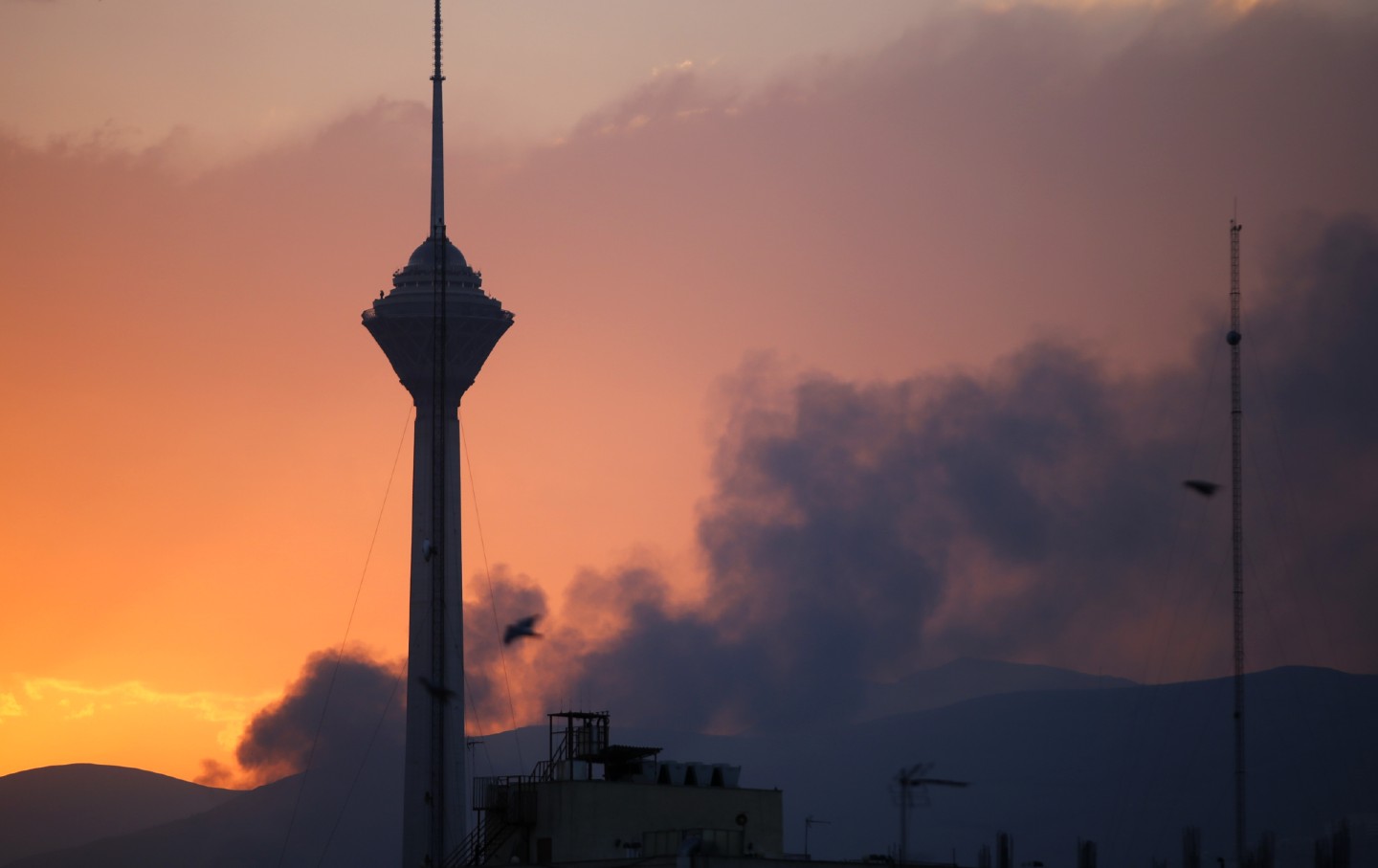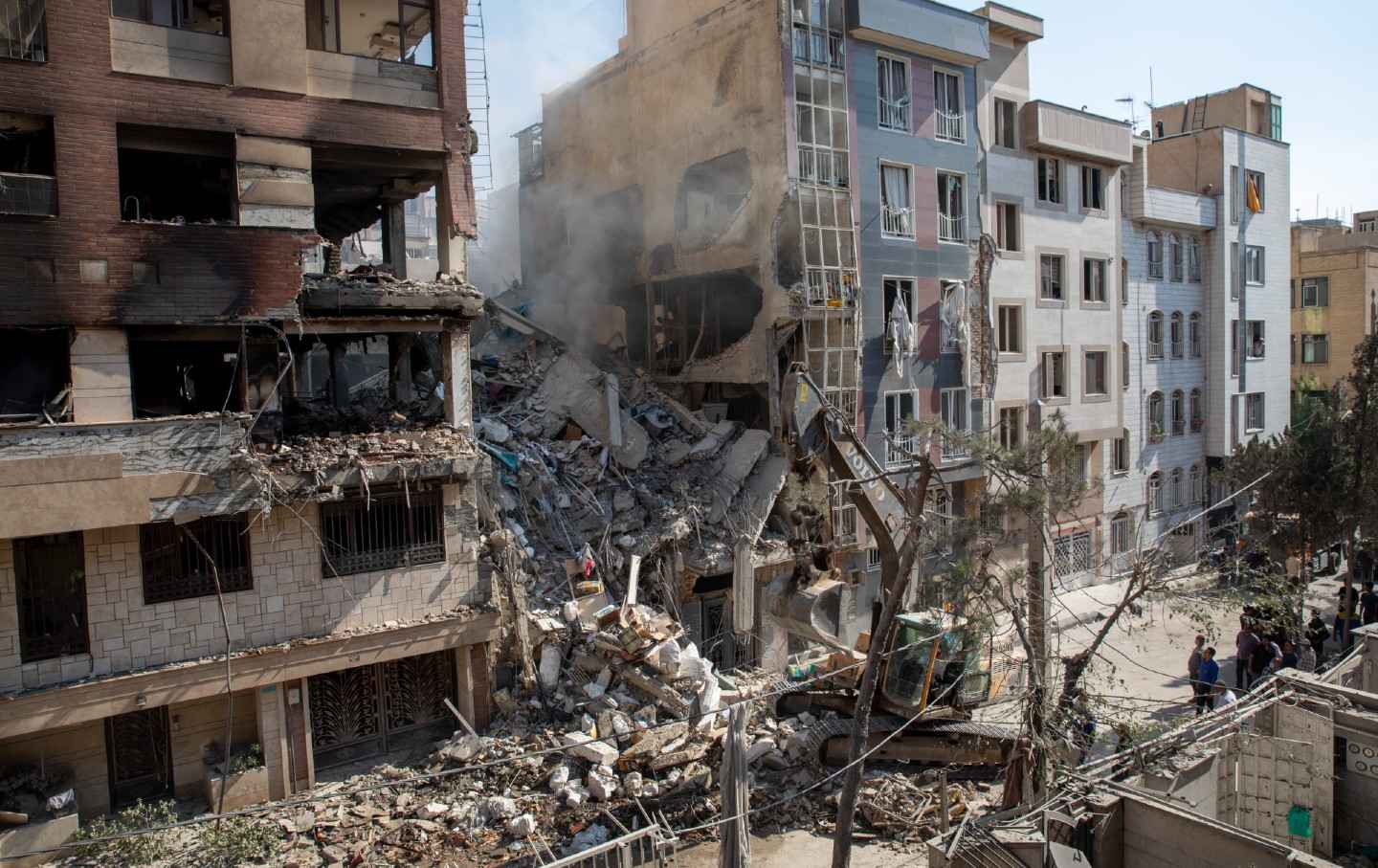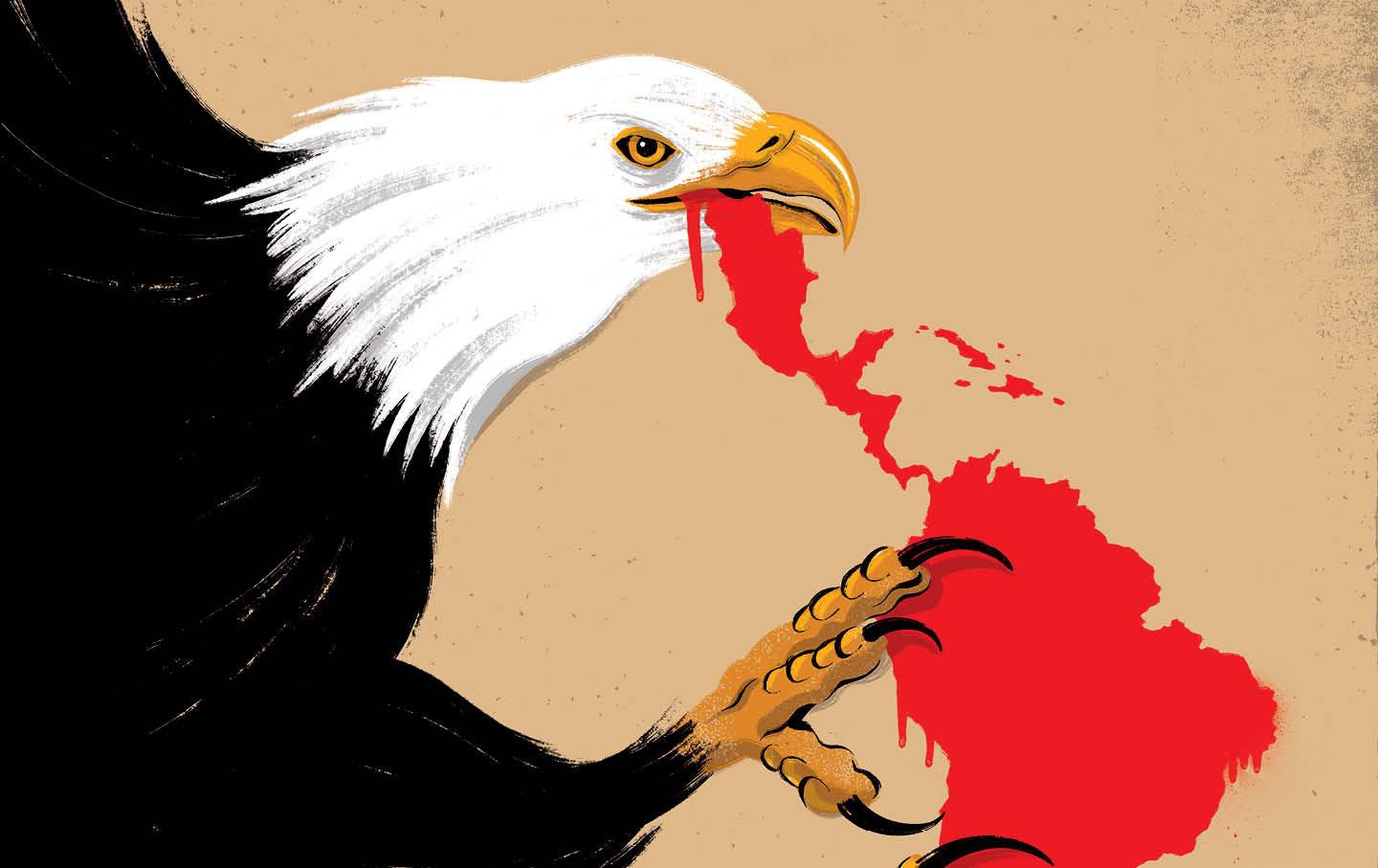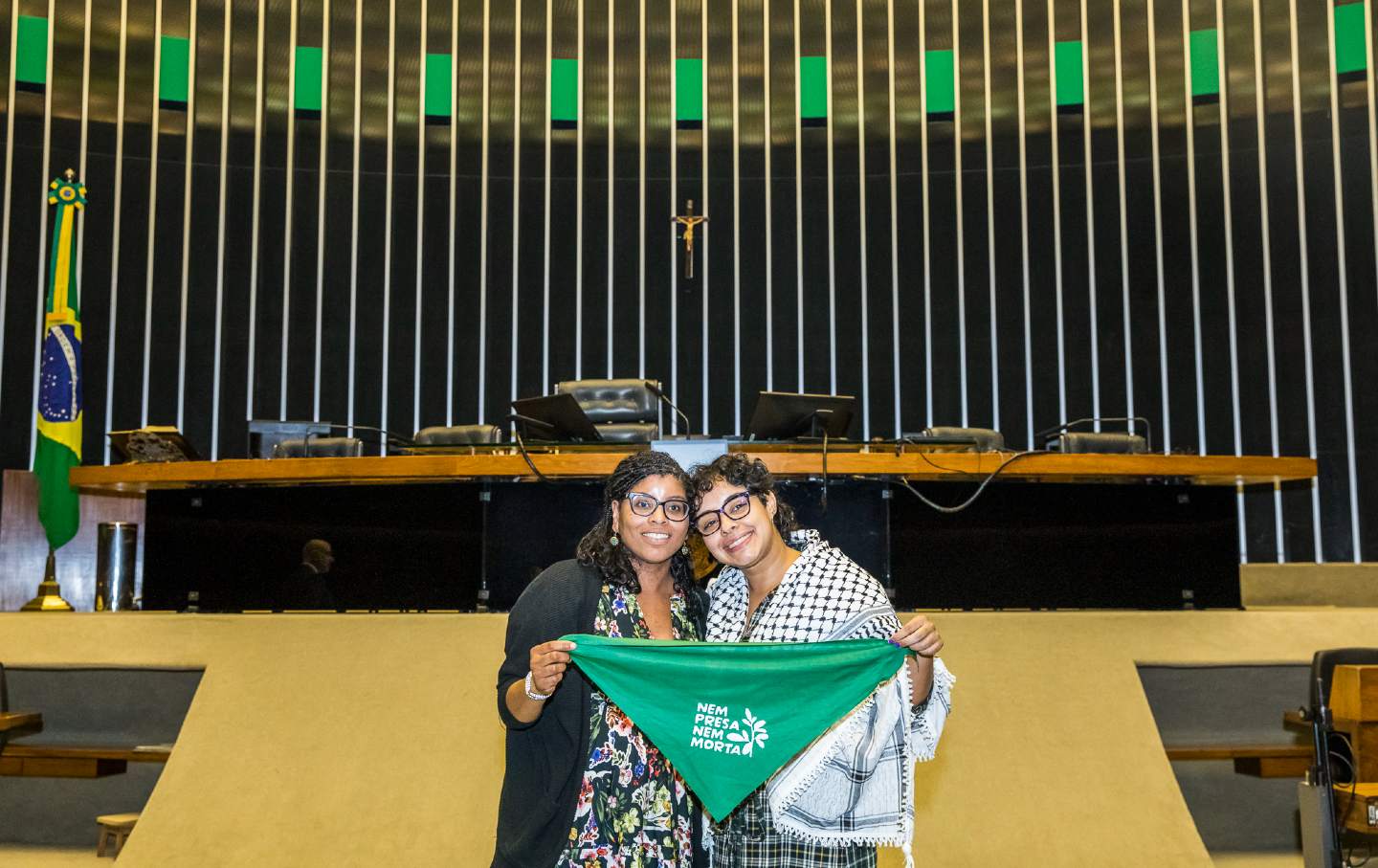The Cost of Legalizing Abortion in Haiti
Legalization may occur in June 2024, but advocates say the new penal code would undermine any actual progress if enacted unconstitutionally.
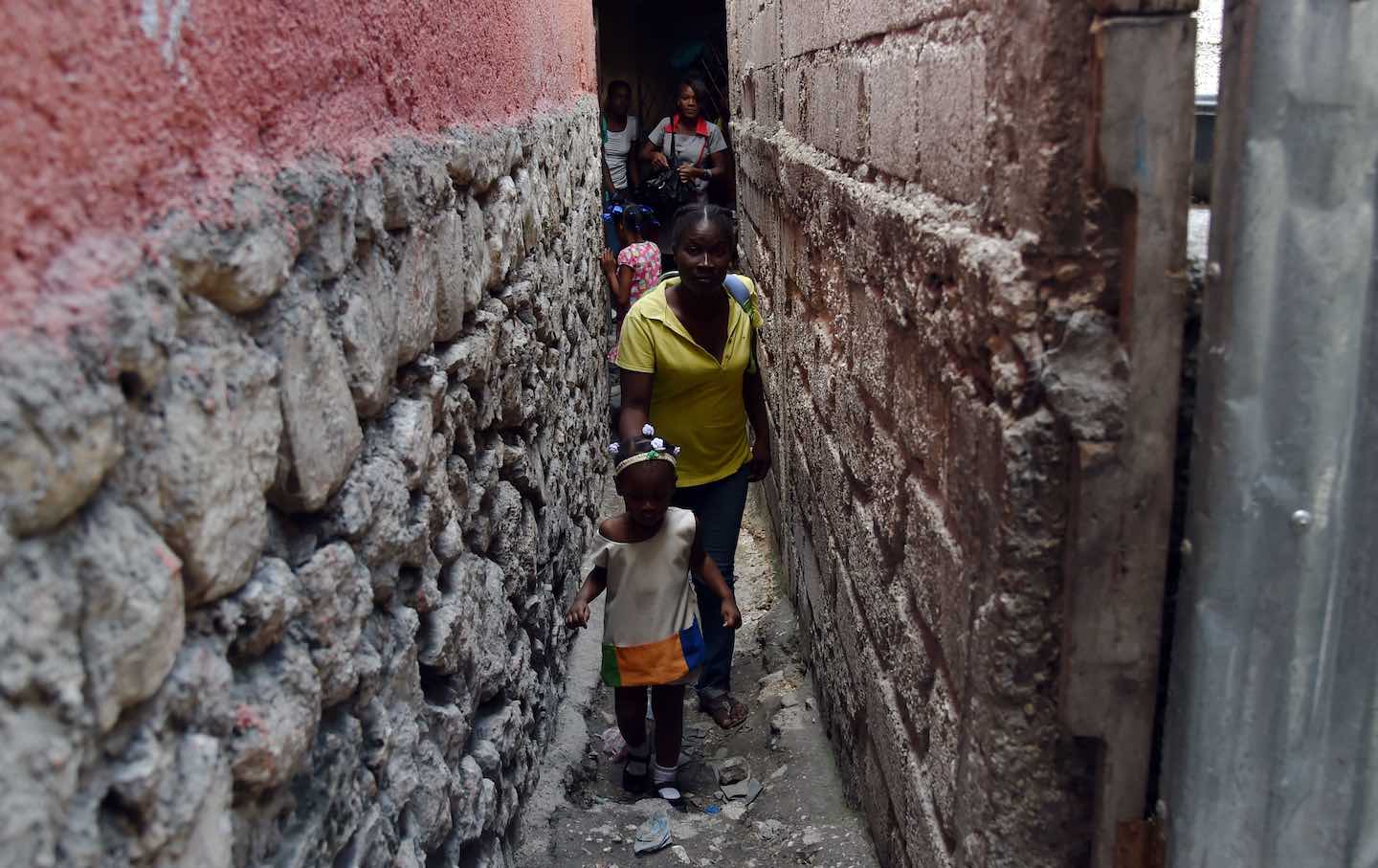
Katiana Pierre was about four months pregnant when she discovered that she was expecting. The 24-year-old mother of three said that when her belly started to show, the lady providing her and her children with shelter in exchange for labor kicked them out. The pregnancy meant too many mouths to feed.
A few months earlier, on July 8, 2022, gang members fatally shot Katiana’s husband as the family tried to escape a territory war that erupted in Cite Soleil, a highly impoverished commune in Haiti controlled by armed criminals. The same men then tortured and sexually assaulted Katiana in front of her kids. Two months later, Katiana was yet again sexually assaulted as she roamed the streets begging for money to feed her children.
When she and her children were forced back onto the streets, Katiana felt alone. “My house was burnt down, my husband dead. I was sleeping in the streets. So I decided not to keep it.” She self-managed her abortion, lacking the money to seek help from a clandestine provider, which can sometimes cost about $50. The country’s current laws prohibit doctors from practicing abortions. She said she first took pills and drank a concoction of medicinal herbs to end the pregnancy. When these methods failed, she reached out to a friend. The friend told her, “I will give you a remedy, but there’s a huge risk you will die in the process,” Katiana recalled.
Katiana was determined to try the method despite the known danger, explaining that she “couldn’t afford to have another child.” So she bought a bottle of Coca-Cola and four packs of tobacco. She added the tobacco to the ice-cold soda, which she then immediately closed and shook. After reopening the bottle, she drank all the foam that came out of it, just as her friend instructed.
As she began to ingest the mixture, Katiana recalled coughing. She said she felt very dizzy and eventually fainted as she finished it. She was rushed to a nearby hospital where she found out that the remedy had, in fact, almost killed her. She had also lost the pregnancy. She said she bled profusely while doctors made her push the products of conception out of her. “To this day, I still don’t feel fully healed,” she said. “I did not get rid of it with all my heart, but with sadness. God saw why I did it.”
Haiti is one of the six countries in the Latin America and the Caribbean region that have a total abortion ban. But illegal and unsafe abortions are very common in the country, with an estimated 36 percent of unintended pregnancies between 2015 and 2019 resulting in abortions, according to an ongoing global Guttmacher Institute study. A January 2023 Human Rights Watch report suggests that the complete ban could finally be eradicated with a revised penal code scheduled to take effect in June 2024. If implemented, the new provisions would dramatically change the legal framework regarding abortion and significantly improve the country’s current protections for pregnant people. However, abortion rights advocates have raised concerns about the conditions under which people will be able to access legal abortions, as well as the ability of the reforms to stay in effect over the long term.
Under the existing penal code, which dates back to 1835, both the provider and the person receiving the abortion can face charges if they are reported to law enforcement. Art. 262 explicitly states that anyone who induces abortion through methods like “food, drink, medicine, violence, or by any other means” will be subject to imprisonment. “Physicians, surgeons, and other health officers, as well as pharmacists who have indicated or administered these means, will be condemned to the penalty of forced labor in time, in the event that the abortion would have taken place.” People who procure an abortion for themselves or consent to it also can face life in prison, with no exceptions for cases such as rape or incest.
Not only do these restrictive laws not stop abortions, research shows that extreme bans lead to more unsafe terminations in Haiti and represent a major impediment to reproductive freedom. Haiti has the highest rate of maternal mortality in the Western Hemisphere, with an estimated 480 deaths per 100,000 live births. “We estimate that as high as 20 percent of this rate is due to high-risk abortion,” said Florence Jean Louis Vorbe, the executive director of PROFAMIL.
Founded in 1984 and dedicated to sexual and reproductive health in the country, PROFAMIL initially solely focused on methods of contraception, but it now operates mobile clinics, providing abortion care all over the country. “We do a lot of postabortal services,” Vorbe said. “A lot of women come to us with an abortion that is not finished for us to complete. We have the right to complete it, but not to initiate it.”
Like PROFAMIL, Nègès Mawon deals with numerous cases in which they have to finalize abortions following initial illegal attempts and complications. The organization, which helps women survivors of violence find care, says more and more people become pregnant and need abortions because of the increasing gang violence that hamstrings the country.
“We have a lot of rapes of minors, a lot of rapes of girls, and so a lot of pregnancies,” says Pascale Solages, Nègès Mawon’s cofounder and director. “We see a lot of women coming to us with HIV or other sexual diseases.” The organization assisted Katiana in accessing care at a local hospital several times, and provided her with a marraine (godmother) through its sponsorship program, a collaboration with the Safe Abortion Action Fund—a global funding organization supporting abortion care advocacy in low- and middle-income countries. The marraine offers support and guidance, accompanying the women to different appointments with experts within the organization’s network of health care providers.
There have been several talks in the past by international and local human rights organizations about decriminalizing abortion in Haiti. Shortly after the 2010 earthquake, international NGOs denounced the country’s restrictive anti-abortion law. As the explosion of the “tent babies” saw more and more women turning to “dangerous ways to terminate unwanted pregnancies,” Health Ministry officials reported that post-abortion complications accounted for as much as 30 percent of maternal deaths on the island at the time.
Popular
“swipe left below to view more authors”Swipe →MADRE, an international human rights organization that had been advocating for revisions to Haiti’s anti-abortion law since 2010, began organizing workshops and building momentum for the passage of a draft penal code in 2013. These workshops were conducted in partnership with the Haitian Ministry of Justice and Public Security, the Haitian Ministry on the Condition of Women’s Rights and Affairs, and several local and international women’s organizations to address sexual and gender-based violence in Haiti.
In June 2020, the late President Jovenel Moise promulgated by decree reforms to the Haitian penal code, meaning that it was not voted on by any elected officials. The revised code was first scheduled to take effect in June 2022, but it was delayed until next year by Moise’s assassination in 2021 and a push to have the new code approved by Parliament.
The revised penal code will legalize abortion in all circumstances until the 12th week of pregnancy, and at any time in cases of rape or incest or when the mental or physical health of the pregnant person is in danger. It also lists sexual harassment and gender-based violence as punishable offenses.
Although the penal code would advance a progressive policy, advocacy groups, elected officials, and several other pro-abortion organizations have criticized the late president’s action as “a gross abuse of power that undermines the rule of law in Haiti.” In a joint report to the United Nations Human Rights Council, several advocacy groups noted that although the revised penal code had been drafted “under the leadership of the Ministry on the Status of Women and Women’s Rights,” it was never reviewed by Parliament, which was dissolved in January 2020. Those opposed to the revised code say promulgating those reforms through executive decree is profoundly unconstitutional. What’s to stop future presidents from making other changes that would have the opposite effect and lead to the overturning of fundamental rights? And activists who have been fighting for the legalization of abortion for years argue that the new penal code would undermine any actual progress if enacted unconstitutionally.
“We want the total decriminalization of abortion in the country, of course,” says Pascale Solages, cofounder and director of the feminist organization Nègès Mawon. “But we know that when we do politics, progress takes time and baby steps.… Because we are feminist and human rights activists, we fight for good governance, too.”
Furthermore, they condemn the lack of social implementation, of adequate education for the public and training for clinicians, which threaten the successful implementation of these provisions. “If lay people aren’t aware of these reforms, if women don’t know about these discussions, and if there are no measures put in place to assist women who become pregnant, then nothing will really change,” said Rosy Auguste Ducena, the program director of the Haiti-based Réseau National de Défense des Droits Humains (RNDDH), which monitors violence against women.
Social inequalities play a major role in who is able to access abortions in the country. The situation tends to be less grim for wealthy families. “A working woman or a girl whose parents have money can easily find a trained doctor willing to perform their abortion safely,” said Ducena. “Whereas in poor neighborhoods, when a child or woman has an unwanted pregnancy, they are either forced to keep the baby or risk their life in high-risk abortions.”
Because Haiti has a very patriarchal and conservative society, with Catholicism being the predominant religion, talking openly about abortion is taboo, and women and girls tend to experience shame before or following an abortion. Stigma, therefore, represents a significant barrier to abortion care in the country. But that’s also the reason current anti-abortion laws aren’t really enforced. Abortion cases rarely come before a judge. “I have never heard of anyone going to criminal court for an abortion case,” said Mario Joseph, a lawyer and director of Haiti-based organization, Bureau des Avocats Internationaux, one of the organizations that submitted the report to the UN Human Rights Council. “So I don’t believe these new provisions will have an impact on the prosecution of this crime.”
Joseph also doubts that the revised penal code will lead to better tracking of the number of abortion cases that occur in the country. Either way, “the Ministry of Public Health and Population does not take measures to monitor the operation of the country’s health institutions. So it can be said that the tracking of abortion cases is the first obstacle to the application of the new provisions of the Penal Code relating to abortion.”
For Haiti to experience real change, local women’s rights activists demand the complete legalization of abortion to respect the bodily autonomy of women and girls. But these “changes must be enacted in a constitutional manner,” as envisioned in the constitution for enacting major reforms to the penal code.
By the same token, abortion services should be free and there should be better regulation. “It’s a question of economic vulnerability, and we are supposed to have sanctions for people who do unsafe abortion because there are a lot of people who sell medication and give abortion services that they don’t have the skills for,” Solages said. “And we are supposed to have a judiciary or a system that can pursue and sanction.”
Finally, advocates also stress the importance of understanding the root issue at play: the larger women’s rights violations in the country. Failure to resolve the illegitimate government will make it really hard to get to a place where women can reasonably access abortion and other protections against gender-based violence.
Considering the current debate surrounding the revised code, local advocates do not believe these provisions will take effect come June 2024. “We don’t have a parliament. We don’t have a president. We don’t have local power. We don’t have anything,” Solages said. “So we don’t know how the situation will [evolve] in the country.” In the meantime, advocates say it is essential for the government to invest in education campaigns to ensure that women and girls can make informed choices about their reproductive health. “For things like emergency contraception, I don’t think that 5 percent of the women here in Haiti know about it,” said Vorbe.
For its part, Nègès Mawon is educating women and girls in impoverished neighborhoods by producing a play called Danta. The play portrays a woman grieving the death of her daughter from an unsafe abortion. After the play, nurses and professionals answer viewers’ questions, providing valuable information. Advocates are seeking to empower women with these discussions, which they see as helping them beyond what any revised penal code would do on its own.
Interviews with Katiana Pierre and the Réseau National de Défense des Droits Humains–RNDDH were conducted in Creole and French and translated by the writer.
Be part of 160 years of confronting power
Every day, The Nation exposes the administration’s unchecked and reckless abuses of power through clear-eyed, uncompromising independent journalism—the kind of journalism that holds the powerful to account and helps build alternatives to the world we live in now.
We have just the right people to confront this moment. Speaking on Democracy Now!, Nation DC Bureau chief Chris Lehmann translated the complex terms of the budget bill into the plain truth, describing it as “the single largest upward redistribution of wealth effectuated by any piece of legislation in our history.” In the pages of the June print issue and on The Nation Podcast, Jacob Silverman dove deep into how crypto has captured American campaign finance, revealing that it was the top donor in the 2024 elections as an industry and won nearly every race it supported.
This is all in addition to The Nation’s exceptional coverage of matters of war and peace, the courts, reproductive justice, climate, immigration, healthcare, and much more.
Our 160-year history of sounding the alarm on presidential overreach and the persecution of dissent has prepared us for this moment. 2025 marks a new chapter in this history, and we need you to be part of it.
We’re aiming to raise $20,000 during our June Fundraising Campaign to fund our change-making reporting and analysis. Stand for bold, independent journalism and donate to support The Nation today.
Onward,
Katrina vanden Heuvel
Publisher, The Nation

